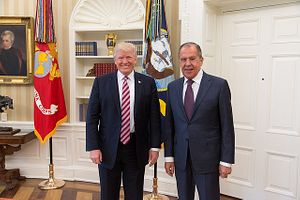Over the past two weeks – or over the past 18 months, really – there has been no shortage of stories, angles, and questions surrounding the relationship between Moscow and U.S. President Donald Trump. From Trump’s former national security adviser misleading other White House officials about communications with Russia to Trump firing FBI head James Comey due, at least in part, to ongoing investigations into Russian ties to Trump’s presidential campaign — all as the White House allowed only Russian media into Trump’s recent meeting with Russian Foreign Minister Sergei Lavrov — the intrigue and developments have been difficult to keep up with. And despite Trump’s whingeing that the no politician “has been treated worse or more unfairly” than him, there’s little sign the investigations into the presidential camp’s ties with Moscow will let up anytime soon.
All the while, though, Washington’s post-Soviet policy continues ahead — and continues, some four months into Trump’s tenure, largely unchanged. If anything, Washington’s current Russia policy has been placed in something of a “receivership,” as American University Professor Keith Darden recently noted: The White House, the theory goes, can’t be seen as soft on Russia, as any move toward conciliation – say, via lifting sanctions — would be spun as simple outgrowth of Moscow pulling the president’s strings. As such, any move toward an Obama-style reset has been effectively strangled in the crib, snuffed out before the president could embrace Russian President Vladimir Putin.
If anything, there are indications Washington has actually moved even further from the possible reconciliation that Russia, with its beleaguered economy, has sought. Not only did Trump authorize airstrikes against Russia’s Syrian partners, but the Treasury Department recently turned down Exxon’s request for a sanctions waiver, helping prolong the sanctions regime denting Russia’s economy.
Moreover, Trump recently signed an appropriations bill that not only furthers Obama-era policies regarding Russian expansionism, but explicitly singled out Russian culpability in unsettling other post-Soviet states. The massive bill, signed by Trump on May 5, devoted an entire section to “countering Russian influence and aggression.” Unlike prior appropriation bills, the new law specifically describes Russia’s ongoing occupation of the Georgian provinces of Abkhazia and South Ossetia as just that: occupation. Unlike bills in 2015 and 2016, the 2017 version notes that none “of the funds appropriated by this Act may be made available for assistance [to a country that] has recognized the independence of, or has established diplomatic relations with, the Russian occupied Georgian territories of Abkhazia and Tskhinvali Region/South Ossetia.”
This provision only targets a handful of countries, including Russia, Nicaragua, Venezuela, and Nauru — the latter of which Russia reportedly bribed with upwards of $50 million for recognizing the “independence” of Abkhazia and South Ossetia. A pair of Pacific states, Tuvalu and Vanuatu, initially supported Moscow’s moves, although both later rescinded their recognition.
However, there’s another provision that may have wider implications for the U.S.’s post-Soviet policy but which, over the past few years, has seen only slight attention. As with the past two appropriations bills, the latest iteration prohibits funds for countries that have “taken affirmative steps intended to support or be supportive of the Russian Federation annexation of Crimea.” This definition would, presumably, extend to countries like Kazakhstan and Kyrgyzstan, whose leaders both backed the “referendum” Russia held on the peninsula in 2014. (Afghanistan’s former president, Hamid Karzai, also lauded the referendum as an expression of the “free will” of Crimeans.) A further 10 countries, including North Korea, also sided with Russia in a 2014 United Nations vote on supporting the territorial integrity of Ukraine, although it’s unclear if such definition would meet the threshold of the recent appropriation bill’s text.
As it is, the spending bill allows the secretary of state to waive such restrictions if it is “in the national interest of the United States,” which would allow the United States to continue allocating funds to the states supporting Russia’s expansionism. But the bill — which comes with additional appropriation for “assistance to counter Russian influence and aggression in countries in Europe and Eurasia” — signals, if nothing else, an expansion of Obama-era policies targeting Moscow’s irredentism. Trump, of course, is notorious for ignoring finer details, and may simply have no idea such provisions made it into the bill he signed. But Washington’s regional policies show little sign of changing in the near-future, no matter what the new special counsel examining Moscow’s ties in the White House may find.

































